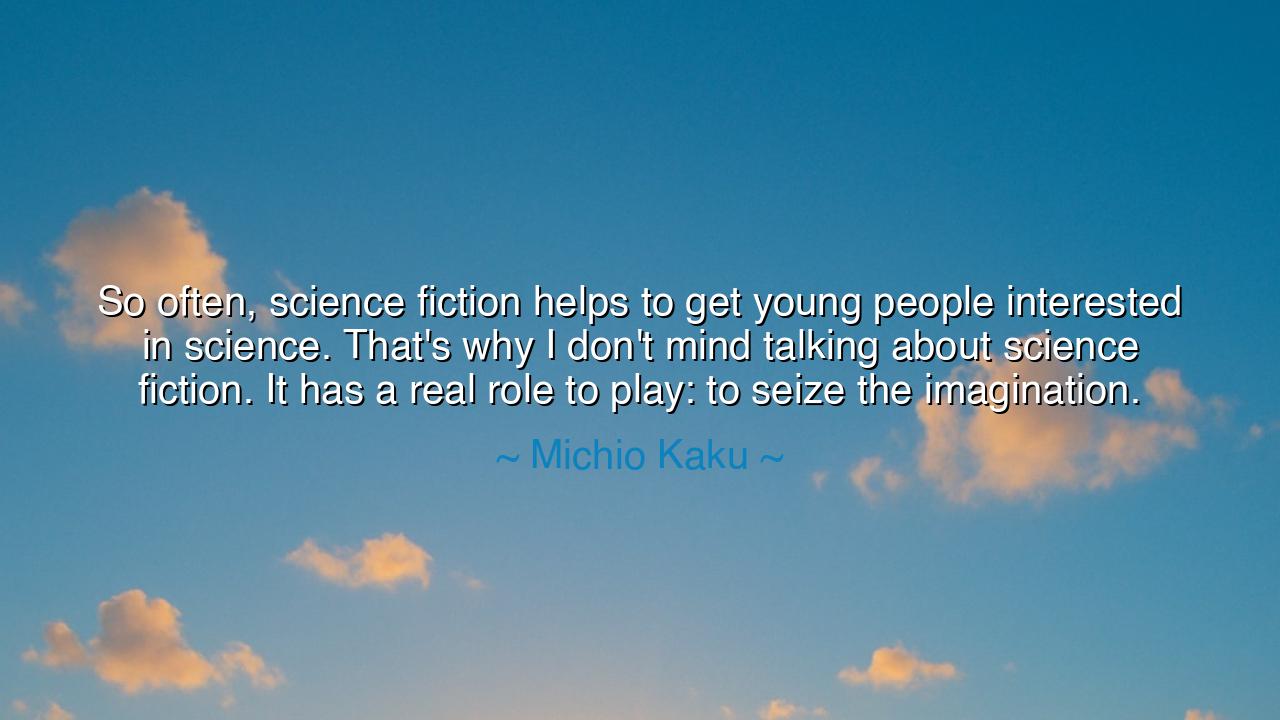
So often, science fiction helps to get young people interested in
So often, science fiction helps to get young people interested in science. That's why I don't mind talking about science fiction. It has a real role to play: to seize the imagination.






O children of the earth, gather now and listen to the wise words of Michio Kaku, whose understanding of science fiction and its role in shaping the minds of the young speaks to the heart of human curiosity. He said, "So often, science fiction helps to get young people interested in science. That's why I don't mind talking about science fiction. It has a real role to play: to seize the imagination." These words carry a profound truth about the nature of science and its deep connection to the imagination—how the worlds of fantasy and science fiction open the doors of possibility, guiding the young mind toward exploration, discovery, and innovation. Kaku speaks not of escapism, but of a gateway, one that leads to the very heart of understanding the universe.
In this world, science has long been seen as a realm of logic, structure, and reason. Yet, Kaku reminds us that science is not separate from imagination; it is imagination that sparks the curiosity and wonder that drive scientific discovery. Science fiction, that great genre that has birthed worlds of futuristic technology, alien life, and space exploration, is the very imagination made tangible. It serves as a bridge between what we know and what we can dream, offering young minds the chance to explore the universe not as it is, but as it could be. In this way, science fiction is not just a tale of what-if, but a call to the brave, the curious, and the visionary to reach for the stars.
Consider, O children, the example of Jules Verne, whose tales of voyages to the moon, underwater exploration, and trips to the center of the earth inspired countless generations to look at the world with new eyes. Verne’s imagination took flight in an age when technology was still in its infancy, and yet many of the devices and concepts he described in his novels—such as the submarine or the space capsule—became real within the span of just a few generations. His science fiction was not just a fantastical escape but a vision of what could be achieved if humankind dared to dream and to pursue knowledge. Through the power of imagination, he captured the hearts of young minds, encouraging them to believe in the potential of human innovation.
Likewise, Isaac Asimov, one of the great figures in science fiction, wrote not just about distant planets and alien races, but about the future of humanity and the role of science in shaping that future. His Foundation series delved into the very essence of human society, exploring the ways in which science, mathematics, and rational thought could bring order to chaos. Through his stories, he captured the imagination of young readers, inspiring many of them to take up the mantle of science and technology in real life. Asimov's works were not mere tales of adventure, but blueprints for the minds of the future—minds that would one day push the boundaries of what was possible.
And yet, O children, science fiction does not exist only in the pages of books or on the big screen. It lives in the hearts and minds of those who dare to dream, who dare to imagine. Think of the great minds of the past, like Leonardo da Vinci, whose drawings of flying machines and robots were born of a visionary imagination. Though da Vinci’s ideas may have seemed impossible in his time, his imagination sparked future generations of scientists and engineers to bring his dreams into the physical world. In the same way, science fiction today continues to light the fire of imagination, inspiring a new generation to reach for the stars and to solve the problems of tomorrow.
The lesson here, O children, is that science and imagination are not opposites, but partners. Science fiction is the spark that ignites the fire of invention, guiding young minds to explore the mysteries of the universe and to ask the big questions. Through science fiction, you learn to see not just the world as it is, but as it could be—more advanced, more connected, more sustainable. Kaku’s words remind us that imagination is not something to be feared, but to be embraced. It is the key to understanding the world, to discovering new realms of knowledge, and to creating the future.
So, O children, never let your imagination be stifled. Science fiction is not just a means of escaping reality—it is a tool for creating a better reality. Use it to inspire your dreams, your ideas, and your pursuits. Read, explore, and imagine the future. Ask yourself what is possible and what is yet to be discovered. The great scientists of tomorrow are often those who were once the curious readers of today, lost in the pages of science fiction, believing in the possibilities that the world had yet to bring to life. In your own hearts, you carry the potential to change the world, to create worlds that we have yet to know. Reach for the stars, O children, and let the imagination be your guide.






AAdministratorAdministrator
Welcome, honored guests. Please leave a comment, we will respond soon